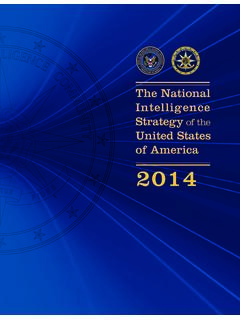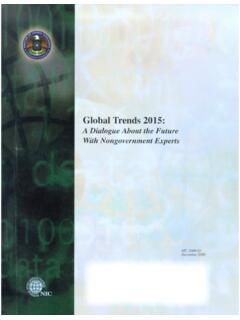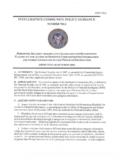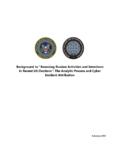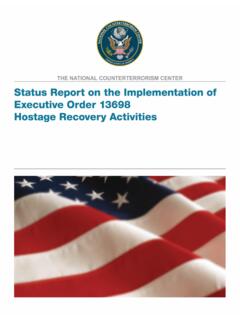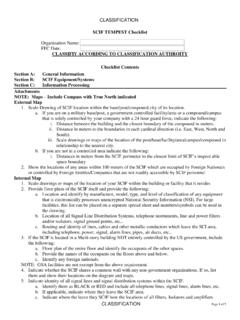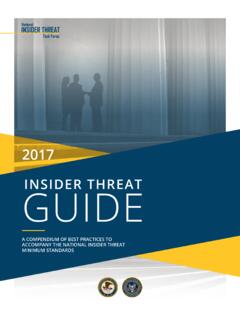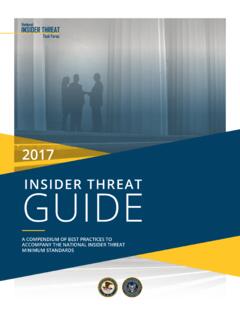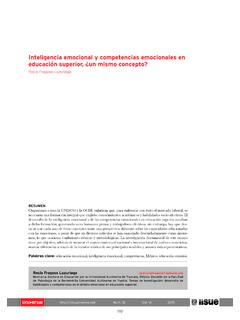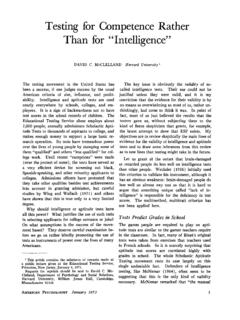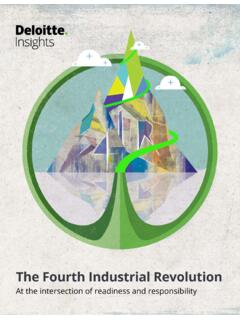Transcription of The National Intelligence Strategy - dni.gov
1 National GEOSPATIAL- Intelligence AGENCY UNITED STATES OF AMERICAIC VisionA Nation made more secure by a fully integrated, agile, resilient, and innovative Intelligence Community that exemplifies America s MissionProvide timely, insightful, objective, and relevant Intelligence and support to inform National security decisions and to protect our Nation and its National Intelligence Strategyof the United States of AmericaThis National Intelligence Strategy (NIS) provides the Intelligence Community (IC) with strategic direction from the Director of National Intelligence (DNI) for the next four years. It supports the National security priorities outlined in the National Security Strategy as well as other National strategies. In executing the NIS, all IC activities must be responsive to National security priorities and must comply with the Constitution, applicable laws and statutes, and Congressional oversight requirements.
2 All our activities will be conducted consistent with our guiding principles: We advance our National security, economic strength, and technological superiority by delivering distinctive, timely insights with clarity, objectivity, and independence; we achieve unparalleled access to protected information and exquisite understanding of our adversaries intentions and capabilities; we maintain global awareness for strategic warning; and we leverage what others do well, adding unique value for the the Director of National Intelligence , I am fortunate to lead an Intelligence Community (IC) composed of the best and brightest professionals who have committed their careers and their lives to protecting our National security. The IC is a 24/7/365 organization, scanning the globe and delivering the most distinctive, timely insights with clarity, objectivity, and independence to advance our National security, economic strength, and technological , the fourth iteration of the National Intelligence Strategy (NIS), is our guide for the next four years to better serve the needs of our customers, to help them make informed decisions on National security issues, and to ultimately keep our Nation safe.
3 The NIS is designed to advance our mission and align our objectives with National strategies, and it provides an opportunity to communicate National priority objectives to our workforce, partners, oversight, customers, and also to our fellow face significant changes in the domestic and global environment; we must be ready to meet 21st century challenges and to recognize emerging threats and opportunities. To navigate today s turbulent and complex strategic environment, we must do things differently. This means we must: Increase integration and coordination of our Intelligence activities to achieve best effect and value in executing our mission, Bolster innovation to constantly improve our work, Better leverage strong, unique, and valuable partnerships to support and enable National security outcomes, and Increase transparency while protecting National security information to enhance accountability and public National Intelligence Strategy increases emphasis in these areas.
4 It better integrates counterintelligence and security, better focuses the IC on addressing cyber threats, and sets clear direction on privacy, civil liberties and have crucial work before us. Our customers depend on us to help them to make wise National security decisions, and Americans count on us to help protect the Nation, all while protecting their privacy and civil liberties. We must provide the best Intelligence possible to support these objectives; doing so is a collective responsibility of all of our dedicated IC professionals and, together with our partners, we can realize our vision. Our ongoing goal is to continue to be the very best Intelligence community in the world. Thank you for your service and for bringing your talent and commitment to the work of keeping our Nation safe each and every day. Thank you for your dedication to our mission and to the security of our fellow citizens as we take this journey NIS 3 From the Director of National IntelligenceDaniel R.
5 CoatsDirector of National IntelligenceThe strategic environment is changing rapidly, and the United States faces an increasingly complex and uncertain world in which threats are becoming ever more diverse and interconnected. While the IC remains focused on confronting a number of conventional challenges to National security posed by our adversaries, advances in technology are driving evolutionary and revolutionary change across multiple fronts. The IC will have to become more agile, innovative, and resilient to deal effectively with these threats and the ever more volatile world that shapes them. The increasingly complex, interconnected, and transnational nature of these threats also underscores the importance of continuing and advancing IC outreach and cooperation with international partners and EnvironmentTraditional adversaries will continue attempts to gain and assert influence, taking advantage of changing conditions in the international environment including the weakening of the post-WWII international order and dominance of Western democratic ideals, increasingly isolationist tendencies in the West, and shifts in the global economy.
6 These adversaries pose challenges within traditional, non-traditional, hybrid, and asymmetric military, economic, and political spheres. Russian efforts to increase its influence and authority are likely to continue and may conflict with goals and priorities in multiple regions. Chinese military modernization and continued pursuit of economic and territorial predominance in the Pacific region and beyond remain a concern, though opportunities exist to work with Beijing on issues of mutual concern, such as North Korean aggression and continued pursuit of nuclear and ballistic missile technology. Despite its 2015 commitment to a peaceful nuclear program, Iran s pursuit of more advanced missile and military capabilities and continued support for terrorist groups, militants, and other opponents will continue to threaten interests. Multiple adversaries continue to pursue capabilities to inflict potentially catastrophic damage to interests through the acquisition and use of weapons of mass destruction (WMD), which includes biological, chemical, and nuclear addition to these familiar threats, our adversaries are increasingly leveraging rapid advances in technology to pose new and evolving threats particularly in the realm of space, cyberspace, computing, and other emerging, disruptive technologies.
7 Technological advances will enable a wider range of actors to acquire sophisticated capabilities that were previously available only to well-resourced longer a solely domain, the democratization of space poses significant challenges for the United States and the IC. Adversaries are increasing their presence in this domain with plans to reach or exceed parity in some areas. For example, Russia and China will continue to pursue a full range of anti-satellite weapons as a means to reduce military effectiveness and overall security. Increasing commercialization of space now provides capabilities that were once limited to global powers to anyone that can afford to buy them. Many aspects of modern society to include our ability to conduct military operations rely on our access to and equipment in space. Cyber threats are already challenging public confidence in our global institutions, governance, and norms, while imposing numerous economic costs domestically and globally.
8 As the cyber capabilities of 4our adversaries grow, they will pose increasing threats to security, including critical infrastructure, public health and safety, economic prosperity, and stability. Emerging technologies, such as artificial Intelligence , automation, and high performance computing are advancing computational capabilities that can be economically beneficial, however these advances also enable new and improved military and Intelligence capabilities for our adversaries. Advances in nano- and bio-technologies have the potential to cure diseases and modify human performance, but without common ethical standards and shared interests to govern these developments, they have the potential to pose significant threats to interests and security. In addition, the development and spread of such technologies remain uneven, increasing the potential to drastically widen the divide between so-called haves and have-nots.
9 Advances in communications and the democratization of other technologies have also generated an ability to create and share vast and exponentially growing amounts of information farther and faster than ever before. This abundance of data provides significant opportunities for the IC, including new avenues for collection and the potential for greater insight, but it also challenges the IC s ability to collect, process, evaluate, and analyze such enormous volumes of data quickly enough to provide relevant and useful insight to its advances in communications and the democratization of other technologies have empowered non-state actors and will continue to exponentially expand the potential to influence people and events, both domestically and globally. The ability of individuals and groups to have a larger impact than ever before politically, militarily, economically, and ideologically is undermining traditional institutions.
10 This empowerment of groups and individuals is increasing the influence of ethnic, religious, and other sources of identity, changing the nature of conflict, and challenging the ability of traditional governments to satisfy the increasing demands of their populations, increasing the potential for greater instability. Some violent extremist groups will continue to take advantage of these sources and drivers of instability to hold territory, further insurgencies, plan external attacks, and inspire followers to launch attacks wherever they are around the migration and urbanization of populations are also further straining the capacities of governments around the world and are likely to result in further fracturing of societies, potentially creating breeding grounds for radicalization. Pressure points include growing influxes of migrants, refugees, and internally displaced persons fleeing conflict zones; areas of intense economic or other resource scarcity; and areas threatened by climate changes, infectious disease outbreaks, or transnational criminal organizations.
